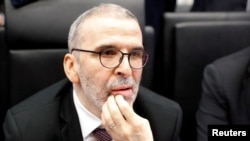In a furious televised speech, Mustafa Sanalla said Prime Minister Abdulhamid al-Dbeibah's mandate to govern had expired and warned him not to touch him and NOC.
Deibah issued a decision on Tuesday to install Farhat Bengdara in place of National Oil Corporation chief Mustafga Sanalla at the head of a new NOC board and then set up a committee to manage the transition.
The U.S. Embassy in Libya expressed alarm on Thursday over the struggle for control of Libya's oil corporation, saying that it's monitoring the developments with "deep concern," the embassy tweeted. It further stated that The National Oil Corporation had maintained its political independence and performed well under Sanalla's leadership, in a sign of U.S. support for him.
"The reported replacement of the NOC board may be contested in court but must not become the subject of armed confrontation," the U.S. Embassy added in its statement.
Analysts say the appointment of Bengdara, a central bank governor before 2011 and reputed ally of eastern commander Khalifa Haftar, to run NOC may herald an attempt by Dbeibah to shore up his position in Tripoli.
The power struggle means major decisions such as replacing the NOC board could trigger bitter opposition.
Sanalla had repeatedly argued with Dbeibah's oil minister, Mohamed Oun.
"I am present in the corporation and work continues. All the decisions are invalid and your government has expired," said Sanalla, who was out of the country taking part in Islam's haj pilgrimage when Dbeibah issued the decision to sack him.
Sanalla accused the United Arab Emirates, which previously backed eastern forces during the civil war, of being behind a series of Libyan oil blockades and his sacking.
Sanalla, who was appointed in 2014 by a previous Tripoli government, has become a key figure alongside central bank governor Sadiq al-Kabir in maintaining the flow of revenue needed to uphold state services during the conflict.
When Libya split between rival eastern and western administrations from 2014-20 with parallel NOC and central bank branches, United Nations Security Council resolutions ensured oil sales were channelled through the Tripoli-based bodies under Sanalla and Kabir.
This year the eastern-based parliament appointed a new government under Fathi Bashagha to replace Dbeibah, who has refused to cede power and remains in control of government ministries in Tripoli. read more
Dbeibah says his mandate will remain until there is an election.
On Tuesday, NOC also said it was resuming exports from two ports closed by an oil blockade and hoped to restart other shuttered facilities soon.
However, groups involved in the shutdowns, who are aligned with Haftar and demand Dbeibah's removal, said on Wednesday they would not allow production to restart.
A spokesperson for the Government of National Unity, which is headed by Dbeibah, was not immediately available for comment.










